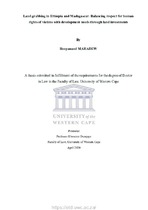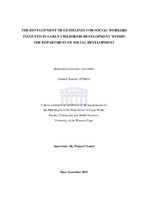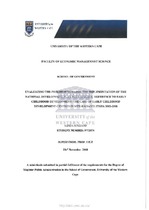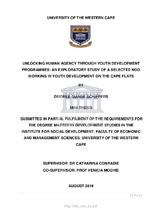Land grabbing in Ethiopia and Madagascar: Balancing respect for human rights of victims with development needs through land investments
Abstract
Many African states are in dire need of economic development to alleviate poverty, enhance the quality of life of peoples and bring development home. To meet this aim, land investments have been the preferred mode of development for a long time on the African continent with particular reference to Ethiopia and Madagascar as selected case studies of this study. Hectares of land are being given away to foreign investors involved in agricultural investments through investments treaties and contracts. The aim is primarily to attract foreign direct investments to boost the economy. Unfortunately, this seems to be a skewed vision of development, focusing exclusively on
economic development without any consideration to social, cultural and political development of people, especially local communities. Such a narrow mode of development is not in line with human rights principles and considerations with thousands of people of the two countries having their basic human rights being constantly and irreparably violated by the actions of foreign investors involved in land investments. Their lands are being grabbed and this is entailing a series of other major infringements of civil and political as well as socio-economic rights intrinsically linked to land. Ethiopia and Madagascar are both parties to major legal instruments on human rights at the UN and
the African level. They have legal obligations to respect, protect and fulfil human rights that are being violated on a daily basis by land grabbing. In addition, their domestic legal frameworks are supposed to confer adequate and effective protection to those human rights and protect them from the negative impacts of land grabbing. When such a mode of economic development is resulting in basic human rights violations, it is clear that such development is not aligned with an all-inclusive and encompassing mode of development. To this end, this study adopts Sen’s Capability Approach to development which advocates that development should render people free and capable.
Individuals have capabilities which must be enhanced and protected. In the context of land grabbing, land, water, food, culture and political participation have been identified as the human capabilities which require the utmost form of protection and respect. The thesis investigates the ways in which international and domestic legal frameworks on human rights can be used to protect the selected capabilities. While economic development in the form of investments and FDI is necessary in any country, there is a pressing need for such national
economic interests to be balanced with human rights of local communities who are the main victims of land grabbing. Accordingly, in terms of the central research question, the study, with references to the two selected jurisdictions, investigates how African states should take appropriate measures and steps to ensure that land investments are compliant with their obligations under international human rights normative framework in a way that renders local communities “capable” in line with Sen’s Capability Approach. In terms of methodology, desk research is used based on reports and data that international research institutions have presented on land grabbing. The common capabilities that are violated in the two jurisdictions are singled out and eventually analysed in line with international human rights framework including the right to development, the right to land, the right to food, the right to water, the right to culture and the right to political participation. The main aim is to examine how a balanced mode of development as proposed by Sen can be achieved using the international framework on human rights, the right to development specifically and the domestic legal framework of the countries.
The study concludes that the human rights framework protecting the identified capabilities is not being effectively complied with by the two selected states. In addition, their domestic legislative framework on human rights is not in conformity and harmony with international standards set by treaties and treaties bodies. Accordingly, the study proposes a number of measures that could be taken by states to achieve the balance between national development interests and human rights.
Collections
Related items
Showing items related by title, author, creator and subject.
-
The development of guidelines for social workers involved in early childhood development within the Department of Social Development
Govender, Badroonesa (University of the Western Cape, 2016)Social workers employed by the Department of Social Development in South Africa are tasked with the provision of a broad spectrum of social services and may specialise in fields, such as welfare planning, which involves ... -
Evaluating the progress towards the implementation of the National Development Plan with specific reference to early childhood development: The case of early childhood development centres in Site-B Khayelitsha 2012-2018
Sixhaso, Linda Patience (University of the Western Cape, 2018)The historic social and economic inequalities had a negative impact on majority of young children in South Africa. This dates back to post-apartheid era where the development of young children. of some previously ... -
Unlocking human agency through youth development programmes: An exploratory study of a selected NGO working in youth development on the Cape Flats
Schippers, Deidree Dianne (University of the Western Cape, 2019)This study explored how human agency could be unlocked through youth development programmes using a case study of a selected NGO working in youth development on the Cape Flats in the Western Cape Province in South Africa. ...




